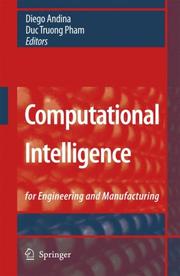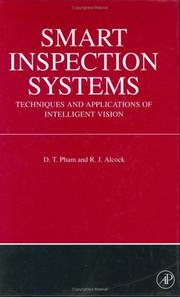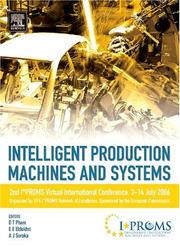| Listing 1 - 10 of 10 |
Sort by
|

ISBN: 0948507772 Year: 1988 Publisher: Kempston IFS publications
Abstract | Keywords | Export | Availability | Bookmark
 Loading...
Loading...Choose an application
- Reference Manager
- EndNote
- RefWorks (Direct export to RefWorks)
Engineering --- Expert systems (Computer science) --- Data processing

ISBN: 1280901438 9786610901432 0387374523 0387374507 1441942475 Year: 2007 Publisher: Dordrecht : Springer,
Abstract | Keywords | Export | Availability | Bookmark
 Loading...
Loading...Choose an application
- Reference Manager
- EndNote
- RefWorks (Direct export to RefWorks)
Unlike traditional computing, Computational Intelligence is tolerant of imprecise information, partial truth and uncertainty. This book presents a collection of contributions on a focused treatment of important elements of CI, centred on its key element: learning.
Computational intelligence. --- Neural networks (Computer science) --- Artificial neural networks --- Nets, Neural (Computer science) --- Networks, Neural (Computer science) --- Neural nets (Computer science) --- Artificial intelligence --- Natural computation --- Soft computing --- Intelligence, Computational --- Computer science. --- Optical pattern recognition. --- Systems engineering. --- Electronics. --- Computer engineering. --- Computational Science and Engineering. --- Pattern Recognition. --- Circuits and Systems. --- Electronics and Microelectronics, Instrumentation. --- Electrical Engineering. --- Optical data processing --- Pattern perception --- Perceptrons --- Visual discrimination --- Informatics --- Science --- Computers --- Electrical engineering --- Physical sciences --- Engineering systems --- System engineering --- Engineering --- Industrial engineering --- System analysis --- Design and construction --- Computer mathematics. --- Pattern recognition. --- Electronic circuits. --- Microelectronics. --- Electrical engineering. --- Electric engineering --- Microminiature electronic equipment --- Microminiaturization (Electronics) --- Electronics --- Microtechnology --- Semiconductors --- Miniature electronic equipment --- Electron-tube circuits --- Electric circuits --- Electron tubes --- Design perception --- Pattern recognition --- Form perception --- Perception --- Figure-ground perception --- Computer mathematics --- Electronic data processing --- Mathematics
Book
ISBN: 3031145372 3031145364 Year: 2023 Publisher: Cham : Springer International Publishing : Imprint: Springer,
Abstract | Keywords | Export | Availability | Bookmark
 Loading...
Loading...Choose an application
- Reference Manager
- EndNote
- RefWorks (Direct export to RefWorks)
This book is the first work dedicated to the Bees Algorithm. Following a gentle introduction to the main ideas underpinning the algorithm, the book presents recent results and developments relating to the algorithm and its application to optimisation problems in production and manufacturing. With the advent of the Fourth Industrial Revolution, production and manufacturing processes and systems have become more complex. To obtain the best performance from them requires efficient and effective optimisation techniques that do not depend on the availability of process or system models. Such models are usually either not obtainable or mathematically intractable due to the high degrees of nonlinearities and uncertainties in the processes and systems to be represented. The Bees Algorithm is a powerful swarm-based intelligent optimisation metaheuristic inspired by the foraging behaviour of honeybees. The algorithm is conceptually elegant and extremely easy to apply. All it needs to solve an optimisation problem is a means to evaluate the quality of potential solutions. This book demonstrates the simplicity, effectiveness and versatility of the algorithm and encourages its further adoption by engineers and researchers across the world to realise smart and sustainable manufacturing and production in the age of Industry 4.0 and beyond. .
Industrial engineering. --- Automation. --- Artificial intelligence. --- Production engineering. --- Cloud Computing. --- Robotics. --- Machine learning. --- Industrial Automation. --- Artificial Intelligence. --- Industrial and Production Engineering. --- Machine Learning. --- Learning, Machine --- Artificial intelligence --- Machine theory --- Automation --- Electronic data processing --- Web services --- Manufacturing engineering --- Process engineering --- Industrial engineering --- Mechanical engineering --- AI (Artificial intelligence) --- Artificial thinking --- Electronic brains --- Intellectronics --- Intelligence, Artificial --- Intelligent machines --- Machine intelligence --- Thinking, Artificial --- Bionics --- Cognitive science --- Digital computer simulation --- Logic machines --- Self-organizing systems --- Simulation methods --- Fifth generation computers --- Neural computers --- Automatic factories --- Automatic production --- Computer control --- Engineering cybernetics --- Factories --- Mechanization --- Assembly-line methods --- Automatic control --- Automatic machinery --- CAD/CAM systems --- Robotics --- Management engineering --- Simplification in industry --- Engineering --- Value analysis (Cost control) --- Distributed processing --- Cloud computing.
Book
ISBN: 3031649362 9783031649363 Year: 2025 Publisher: Cham, Switzerland : Springer,
Abstract | Keywords | Export | Availability | Bookmark
 Loading...
Loading...Choose an application
- Reference Manager
- EndNote
- RefWorks (Direct export to RefWorks)
This book presents new and advanced results and developments related to the Bees Algorithm, along with its application to a wide range of engineering problems. Modern complex processes and systems are difficult to optimise using conventional mathematical tools as they require models that often cannot be obtained with accuracy or certainty. Optimising such systems demands efficient, model-free optimisation tools. The Bees Algorithm, a swarm-based technique inspired by the foraging behaviour of honeybees, is an ideal tool for tackling challenging optimisation problems. The algorithm is conceptually elegant and extremely easy to apply. All it needs to solve an optimisation problem is a means to evaluate the quality of potential solutions. While the covered applications belong to diverse engineering fields, this book’s focus is on advanced manufacturing and industrial engineering. The book comprises two parts. The first part explores different enhancements made to the original Bees Algorithm to improve its performance. The second part delves into the algorithm's applications in design, manufacturing, production, ergonomics, logistics, transportation, and electrical and electronic engineering. By showcasing the variety of optimisation tasks successfully handled using the Bees Algorithm, the book aims to inspire and motivate engineers and researchers worldwide to adopt the algorithm as a powerful and versatile tool for conquering complex engineering problems in the Industry 4.0 era and beyond.
Industrial engineering. --- Production engineering. --- Electric power production. --- Transportation engineering. --- Traffic engineering. --- Artificial intelligence. --- Computer science. --- Industrial and Production Engineering. --- Electrical Power Engineering. --- Transportation Technology and Traffic Engineering. --- Artificial Intelligence. --- Computer Science. --- Nature-inspired algorithms.

ISBN: 1281038482 9786611038489 0080541275 0125541570 9780080541273 9780125541572 9781281038487 6611038485 Year: 2003 Publisher: Amsterdam Boston Academic Press
Abstract | Keywords | Export | Availability | Bookmark
 Loading...
Loading...Choose an application
- Reference Manager
- EndNote
- RefWorks (Direct export to RefWorks)
Smart Inspection Systems - Techniques and Applications of Intelligent Vision will enable engineers to understand the various stages of automated visual inspection (AVI) and how artificial intelligence can be incorporated into each stage to create ""smart"" inspection systems. The book contains many examples that illustrate and explain the application of conventional and artificial intelligence techniques in AVI. The text covers the whole AVI process, from illumination, image enhancement, segmentation and feature extraction, through to classification, and includes case studies of implemented AV
Quality control --- Engineering inspection. --- Optical methods. --- Inspection, Engineering --- Optical inspection --- Optical quality control --- Engineering inspection --- Optical measurements

ISBN: 9780080541273 0080541275 1281038482 9781281038487 9786611038489 6611038485 9780125541572 0125541570 Year: 2003 Publisher: Amsterdam ; New York : Academic Press,
Abstract | Keywords | Export | Availability | Bookmark
 Loading...
Loading...Choose an application
- Reference Manager
- EndNote
- RefWorks (Direct export to RefWorks)
Smart Inspection Systems - Techniques and Applications of Intelligent Vision will enable engineers to understand the various stages of automated visual inspection (AVI) and how artificial intelligence can be incorporated into each stage to create ""smart"" inspection systems. The book contains many examples that illustrate and explain the application of conventional and artificial intelligence techniques in AVI. The text covers the whole AVI process, from illumination, image enhancement, segmentation and feature extraction, through to classification, and includes case studies of implemented AV
Quality control --- Engineering inspection. --- Optical methods.
Book
Abstract | Keywords | Export | Availability | Bookmark
 Loading...
Loading...Choose an application
- Reference Manager
- EndNote
- RefWorks (Direct export to RefWorks)

ISBN: 9780080451572 0080451578 9780080556345 0080556345 Year: 2006 Publisher: Oxford Elsevier
Abstract | Keywords | Export | Availability | Bookmark
 Loading...
Loading...Choose an application
- Reference Manager
- EndNote
- RefWorks (Direct export to RefWorks)
I*PROMS 2005 is an online web-based conference. It provides a platform for presenting, discussing, and disseminating research results contributed by scientists and industrial practitioners active in the area of intelligent systems and soft computing techniques (such as fuzzy logic, neural networks, evolutionary algorithms, and knowledge-based systems) and their application in different areas of manufacturing. Comprised of 100 peer-reviewed articles, this important resource provides tools to help enterprises achieve goals critical to the future of manufacturing. I*PROMS is an European Union-funded network that involves 30 partner organizations and more than 130 researchers from universities, research organizations, and corporations. * State-of-the-art research results * Leading European researchers and industrial practitioners * Comprehensive collection of indexed and peer-reviewed articles in book format supported by a user-friendly full-text CD-ROM with search functionality.
Book
ISBN: 9781904445524 1904445527 Year: 2008 Publisher: [Dunbeath, Scotland] Whittles Publishing
Abstract | Keywords | Export | Availability | Bookmark
 Loading...
Loading...Choose an application
- Reference Manager
- EndNote
- RefWorks (Direct export to RefWorks)
"... the third online, web-based conference on innovative machines and systems organised by the EU-funded I*PROMS Network of Excellence" "... provides an invaluable state of the technology review and assessment, ..." "A variety of topics are considered including advanced production machines; digital and e-manufacturing; human-machine interfaces; innovative and intelligent design technologies; intelligent automation; intelligent optimisation techniques; micro- and nanomanufacturing; production automation and control; reconfigurable manufacturing systems and robotics."--Back print cover.
Computer integrated manufacturing systems --- CAD/CAM systems --- Automatic control --- Intelligent control systems --- Robotics --- Human-machine systems --- Production engineering --- Congresses --- IPROMS --- Innovative production machines --- I*PROMS --- Manufacturing processes --- Automation

ISBN: 9780080451572 0080451578 9780080556345 0080556345 9786611111809 1281111805 Year: 2006 Publisher: Amsterdam ; Oxford : Elsevier,
Abstract | Keywords | Export | Availability | Bookmark
 Loading...
Loading...Choose an application
- Reference Manager
- EndNote
- RefWorks (Direct export to RefWorks)
I*PROMS 2005 is an online web-based conference. It provides a platform for presenting, discussing, and disseminating research results contributed by scientists and industrial practitioners active in the area of intelligent systems and soft computing techniques (such as fuzzy logic, neural networks, evolutionary algorithms, and knowledge-based systems) and their application in different areas of manufacturing. Comprised of 100 peer-reviewed articles, this important resource provides tools to help enterprises achieve goals critical to the future of manufacturing.I*PROMS is an European Un
Automatic control --- Assembly-line methods --- CAD/CAM systems --- Assembly lines --- Production-line methods --- Manufacturing processes --- Mass production --- Plant layout --- Production engineering --- Automation
| Listing 1 - 10 of 10 |
Sort by
|

 Search
Search Feedback
Feedback About UniCat
About UniCat  Help
Help News
News